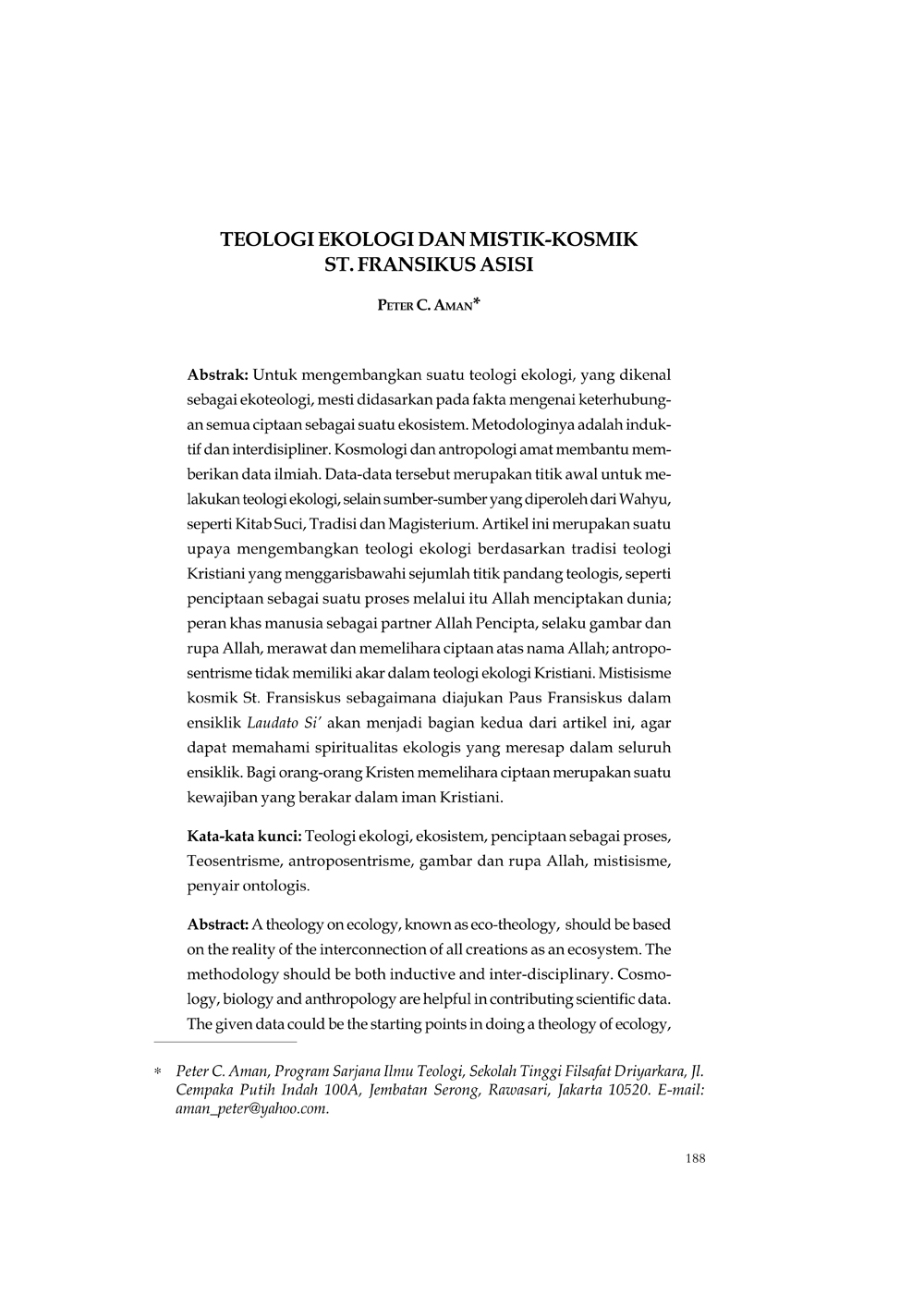Teologi Ekologi dan Mistik-Kosmik St. Fransiskus Asisi
Abstract
Abstrak: Untuk mengembangkan suatu teologi ekologi, yang dikenal sebagai ekoteologi, mesti didasarkan pada fakta mengenai keterhubungan semua ciptaan sebagai suatu ekosistem. Metodologinya adalah induktif dan interdisipliner. Kosmologi dan antropologi amat membantu memberikan data ilmiah. Data-data tersebut merupakan titik awal untuk melakukan teologi ekologi, selain sumber-sumber yang diperoleh dari Wahyu, seperti Kitab Suci, Tradisi dan Magisterium. Artikel ini merupakan suatu upaya mengembangkan teologi ekologi berdasarkan tradisi teologi Kristiani yang menggaris bawahi sejumlah titik pandang teologis, seperti penciptaan sebagai suatu proses melalui itu Allah menciptakan dunia; peran khas manusia sebagai partner Allah Pencipta, selaku gambar dan rupa Allah, merawat dan memelihara ciptaan atas nama Allah; antroposentrisme tidak memiliki akar dalam teologi ekologi Kristiani. Mistisisme kosmik St. Fransiskus sebagaimana diajukan Paus Fransiskus dalam ensiklik Laudato Si akan menjadi bagian kedua dari artikel ini, agar dapat memahami spiritualitas ekologis yang meresap dalam seluruh ensiklik. Bagi orang-orang Kristen memelihara ciptaan merupakan suatu kewajiban yang berakar dalam iman Kristiani.
Kata-kata Kunci: Teologi ekologi, ekosistem, penciptaan sebagai proses, Teosentrisme, antroposentrisme, gambar dan rupa Allah, mistisisme, penyair ontologis.
Abstract: A theology on ecology, known as eco-theology, should be based on the reality of the interconnection of all creations as an ecosystem. The methodology should be both inductive and inter-disciplinary. Cosmology, biology and anthropology are helpful in contributing scientific data. The given data could be the starting points in doing a theology of ecology, besides the resources from Revelation, such as Scriptures, Tradition and Magisterium. This article is an effort to elaborate a theology of ecology based on Christian Tradition of Theology which underlines several theological points of view such as: creation as a process through which God creates the world; a special role as co-partner of the Creator for human being as imago Dei has to conserve and to take care of creation as Gods representative; anthropocentrism has no root on Christian theology of ecology. The Cosmic mysticism of St. Francis, promoted by Pope Francis in his encyclical letter Laudato Si, occupies the second part of this article in order to understand ecological spirituality which emerges throughout the encyclical letter. For Christians, taking care of creation is also an imperative rooted in their Christian faith.
Keywords: Theology of ecology, ecosystem, creation as a process, Theocentrism, anthropocentrism, imago Dei, cosmic mysticism, ontological poet.

DISKURSUS applies the Creative Commons license (CC BY). We allow readers to read, download, copy, distribute, print, search, or link to the full texts of its articles and allow readers to use them for any other lawful purpose. The author must be aware that the article copyrights will be fully transferred to DISKURSUS if the article is accepted to be published in the journal. Once the manuscript has been published, authors are allowed to use their published article under DISKURSUS copyrights. Full information about CC BY can be found here: https://creativecommons.org/licenses/by/4.0/












